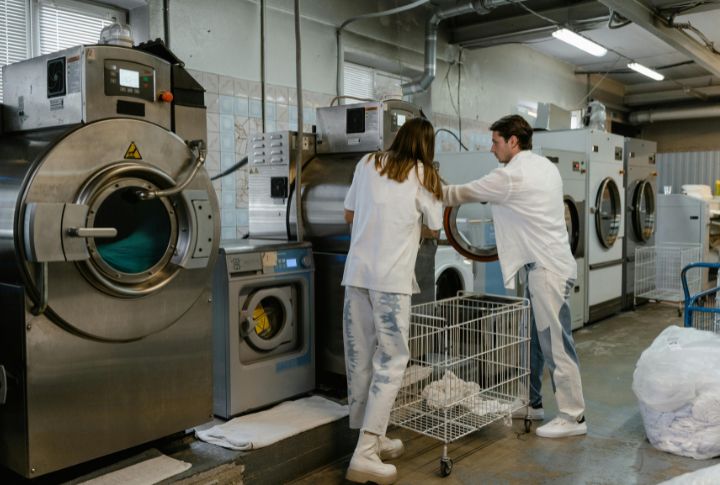Lifestyle
See Which Jobs May Not Make It To 2035

Technology isn’t waiting around. As AI takes on more complex tasks, roles that once took years to master are disappearing faster than expected. Companies now chase flexibility, not routine, and many familiar jobs are quietly vanishing. Curious how the future of work is shifting? Here are the roles already on unstable ground.
Telemarketer

Thanks to advanced AI with humanlike voices, many companies now use automated systems to manage customer calls. These systems operate 24/7, skip the small talk, and complete high volumes of calls efficiently. At the same time, regulations are restricting cold calls from human agents, making traditional telemarketing increasingly obsolete.
Retail Cashier

With more stores adopting self-checkout and mobile payment apps, traditional cashier roles are shrinking. Shoppers increasingly prefer speed and convenience, reducing the need for clerks. As automation grows, technical roles that support these systems, like device maintenance and software troubleshooting, are expected to replace many frontline retail jobs.
Travel Agent

Once the go-to for trip planning, travel agents now compete with algorithms. Sites like Expedia and Kayak handle bookings in seconds, while AI curates experiences to match personal tastes. These days, most travelers skip the human help unless their vacation plans are unusually detailed or expensive.
Data Entry Clerk

Smart scanners and AI now process paperwork and transcribe data far faster than humans, sometimes handling decades of records in days. Advanced handwriting recognition even interprets messy notes accurately. As these tools evolve, traditional data entry roles are fading.
Library Technician

With millions of books digitized and software-handling organizations, libraries rely less on staff. Robots now retrieve materials from storage, while mobile apps handle checkouts. Even the librarian’s role is shifting, replaced by automated systems that deliver knowledge with the push of a button.
Newspaper Delivery Person

Once a daily sight in neighborhoods, newspaper delivery is fading fast. As readers shift to digital news alerts and mobile apps, the need for early-morning doorstep drops has plummeted. Fewer printed papers mean fewer routes—and a role that’s slowly becoming part of the past.
Parking Attendant

Parking attendants are becoming less visible as technology takes over their tasks. Apps now handle reservations and payments, while automated garages use machines to park cars with precision. As cities upgrade their infrastructure, the need for human attendants is steadily shrinking.
Fast Food Cook

Kitchens may soon sound more like factories than diners. Increasingly, robots like Flippy are flipping burgers and dropping fries perfectly every time. What’s more, they never take breaks, burn the food, or even call in sick. Clearly, that’s a tough act for any human to follow.
Bank Teller

Mobile apps now let users handle nearly all banking tasks, including transfers, bill payments, and even check deposits, without entering a branch. With over 70% banking by phone and ATMs covering cash needs, many banks have shut physical locations entirely, marking a major shift in service delivery.
Meter Reader

Nowadays, smart meters send energy usage directly to utility companies—no need to hop fences or knock on doors. These upgrades have made manual checks nearly obsolete. In some cities, even aerial drones monitor systems, pushing the role of traditional meter readers closer to extinction.
Typist/Word Processor

Typing skills, once essential, are no longer a workplace priority. Voice-to-text tools transcribe at speaking speed, and AI finishes thoughts before they’re complete. With reports, emails, and letters auto-generated in moments, the typist’s desk now sits mostly silent in modern offices.
Drone Monitor Technician

As drones become more autonomous, the need for manual drone oversight is shrinking. AI systems now plan routes, avoid obstacles, and conduct surveys independently. In sectors like agriculture and logistics, humans once piloted or monitored every move—now, smart software runs the show with minimal human involvement.
Video Store Clerk

Streaming services let people watch movies anytime, anywhere, with no returns and no late fees. As a result, physical rentals have nearly vanished. Even Netflix, once a DVD service, has gone fully digital. The video store era has ended, replaced by global content libraries at our fingertips.
Textile Factory Worker

As stitches go digital, traditional textile jobs face increasing pressure to remain relevant. AI now designs clothing patterns based on real-time trends. Automated machines and robotic looms then turn those designs into finished garments quickly and cheaply. With production this efficient, factories need fewer hands.
Mail Sorter

Mail sorters once stood at the heart of postal operations, organizing thousands of letters by hand. Now, high-speed scanners and AI systems do the job faster and more accurately. Mailrooms still hum, but it’s the quiet efficiency of machines, not the chatter of busy workers.
Photo Processor

Remember dropping off film and waiting days for prints? That job is nearly gone. AI edits, filters, and enhances photos faster than any human could. As film faded, so did the photo processor’s role. Today, it’s rare to find a lab still doing it the old-fashioned way.
Radio DJ (Traditional)

Many radio stations now run host-free, broadcasting 24/7 without a human voice. Streaming platforms instead curate playlists tailored to mood and music history. Behind the mic, AI can now chat, pause, and even joke. That smooth voice between songs? It’s likely powered by code, not coffee.
Ticket Booth Attendant

Mobile tickets and face-scanning gates are replacing old-school entry lines. Over 80% of tickets are sold online before the showtime. These advances have made the booth attendant role nearly obsolete, which has cut not just jobs but the once-familiar banter at box offices.
Printing Press Operator

Digital platforms let writers reach readers without ever touching the press. Self-publishing and on-demand books have taken over, shrinking the need for traditional printing jobs. As screens replace paper, the printing press operator slowly fades into history—another role disrupted by the rise of direct publishing.
Dry Cleaner Attendant

Wrinkle-resistant fabrics and home cleaning kits are reshaping garment care. AI now identifies fabric types and offers tailored instructions, reducing reliance on professional services. While dry cleaning shops haven’t vanished, many are downsizing.

